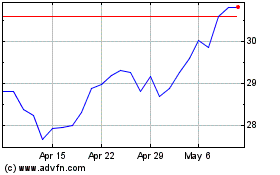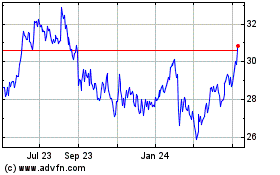Disney, Comcast to Account for Nearly 40% of Spending on U.S. Programming
08 December 2018 - 10:05AM
Dow Jones News
By Erich Schwartzel
LOS ANGELES -- The sale of major assets of 21st Century Fox Inc.
will create two juggernauts of programming, Walt Disney Co. and
Comcast Corp., that will tower over a rapidly consolidating media
and entertainment landscape, according to a report by Ampere
Analysis.
Disney's $71 billion deal to acquire Fox's film and television
divisions and Comcast's agreement to buy the pay-TV operator Sky
PLC will create companies that together control nearly 40% of all
programming spending in the U.S., the analysis found. Globally, the
two will account for 20% of such spending.
"That would be the most concentration we've seen," said Daniel
Gadher, an analyst at the London-based media analysis firm.
The findings underscore how traditional Hollywood studios are
responding to the threat posed by Netflix Inc., which has pledged
to spend $8 billion on programming and helped drive Disney to buy
Fox in the first place. As theatrical attendance stagnates and
cord-cutting consumers cancel cable subscriptions, studios have
been rushing to find ways to pipe their movies and television shows
directly into the home and establish their own commercial
relationships with their customers.
"Netflix was on course to catch -- and overtake -- the top
Hollywood studios by content spend," the report stated. "However,
in light of the two new combined entities, Netflix would now need
to triple spend to achieve this feat."
Now traditional Hollywood is attempting to turn the tables by
siphoning business from Netflix. Ampere projects Disney and
Comcast, through its NBCUniversal and Sky divisions, will spend a
combined $43 billion on programming by the end of 2018 -- $22
billion of it coming from Disney-Fox and the other $21 billion from
NBCUniversal-Sky.
The Disney-Fox share of domestic programming spending will be
23% after the merger, the analysis found.
21st Century Fox and Wall Street Journal -parent News Corp share
common ownership.
The Ampere report, which examined company filings and executive
statements, measured spending on original and licensed programming
produced for viewing in the home, whether through traditional cable
packages or streaming services. Spending on theatrical movie
releases wasn't included.
Disney is planning to start its own direct-to-consumer service
in late 2019, using Fox programming to build out its library. The
service will include movies from Disney mainstays such as Pixar
Animation and Marvel Studios alongside Fox's National
Geographic.
In just over a year, Disney has reoriented itself in an effort
to catch the streaming wave. A separate sports service, ESPN Plus,
started in April, and the Fox deal will also give the company
majority control of the Hulu streaming service when it closes early
next year.
Comcast itself attempted to acquire the Fox film and TV assets
last year, driving up Disney's bid and ultimately walking away with
control of Sky for $38.8 billion. That gives the cable operator a
strong foothold in Europe, where Sky sells phone, TV and internet
services to 23 million customers.
Netflix isn't the only competition they face. AT&T Inc.,
which purchased Time Warner Inc. this year, is planning a streaming
service that will bundle programming from HBO and other properties.
It is also set to launch late next year.
Write to Erich Schwartzel at erich.schwartzel@wsj.com
(END) Dow Jones Newswires
December 07, 2018 17:50 ET (22:50 GMT)
Copyright (c) 2018 Dow Jones & Company, Inc.
Fox (NASDAQ:FOX)
Historical Stock Chart
From Mar 2024 to Apr 2024

Fox (NASDAQ:FOX)
Historical Stock Chart
From Apr 2023 to Apr 2024
